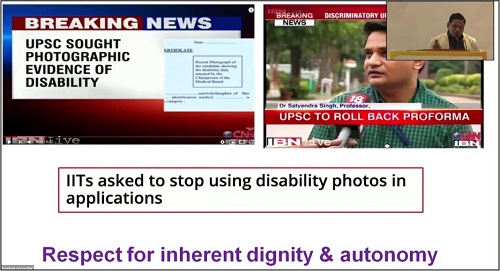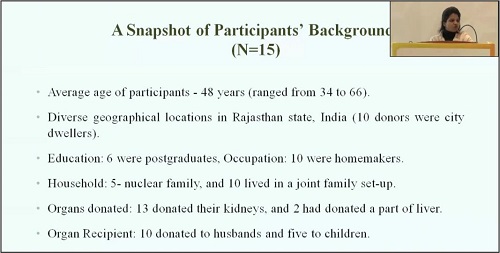Home / Newsletters / ITN 75 / Subscribe
Round Table on Access, Justice, and Autonomy in Transplantation in India
Jaya Jairam, Pallavi Kumar
Indian Transplant Newsletter. 2025 Jan-Mar; 24(1):p10-11
Print ISSN 0972 - 1568
Online ISSN 3048 - 653X
PDF
The Declaration of Istanbul Custodian Group (DICG) and the National Alliance of Transplant Coordinators (NATCO) co-hosted a round table to address ethical, structural, and social challenges in India's organ transplantation system on Feb 9, 2025 at Yashobhoomi Convention Centre, New Delhi. With insights from patient advocates, policymakers, legal experts, recipients and transplant professionals, the discussions centered on access, justice, and donor autonomy.
SESSION : ACCESS AND JUSTICE
Nothing About Us Without Us: The Journey for Inclusion in Health Policy
Dr. Satendra Singh, disability rights activist, critiqued systemic discrimination in healthcare and transplantation against persons with disabilities. He emphasized the need for inclusive, rights-based policies and legal reforms to ensure equity.

Transplantation: A Public Health Perspective
Dr. Mala Ramanathan, an ethicist, emphasized that while recipients are often prioritized, donors-particularly non-related-lack advocacy and long-term protection. She urged for independent oversight and state-supported post-donation care.
Learnings from Patient-Centred Advocacy
Malini Isola, Co-Convenor, All India Drug Action Network (AIDAN), drew on successful drug price advocacy, calling for similar interventions in transplantation: cost caps, public sector investment, action against transplant tourism, and affordable immunosuppressants.
Strategies to Increase Access to Costly Treatments
Prasanna Shirol, Co-Founder, Organisation for Rare Diseases India (ORDI), shared how legal action and public engagement led to rare disease policy gains and over 1,000 patients receiving high-cost treatments. He proposed similar frameworks to improve transplant access.
Incorporating Justice in Transplantation Policy
Dhvani Mehta, Vidhi Centre for Legal Policy, advocated for data-driven and participatory policymaking. Drawing on ethical theory, she stressed on balancing autonomy with fairness in organ allocation.
Dr. Anil Kumar, Director NOTTO, highlighted inconsistent implementation of the Clinical Establishments Act, leading to gaps in patient protection. He emphasized the need for cost regulation and greater transparency to reduce financial barriers in transplantation.
Moderated by Dr. Sanjay Nagral, Co-Chair DICG, the session unpacked contradictions in India's transplant system-where altruistic donation operates within a profit-driven private sector. Key recommendations included: regulating transplant costs, expanding public services, safeguarding donors, ensuring lifelong care, and rebuilding public trust through transparency.
SESSION : DONOR AUTONOMY
Donor's Dilemma
Vasundhara Raghavan, living donor and Founder, Kidney Warriors Foundation, spoke of coercion faced by women donors and the absence of structured post-donation care. She urged for legal safeguards, counseling, and long-term support systems.
The Gender Question: Beyond Numbers
Dr. Nishtha Mishra, researcher, presented findings of her study involved living female donors. NOTTO's data shows that 63% of the living donors are women in India. Dr. Mishra stated that many of the female living donors face familial pressure and lack informed consent. She called for policies that prioritize direct engagement with female donors and address gendered power dynamics.

Recipients Speak
Jaya Jairam, kidney recipient and Project Director at MOHAN Foundation, shared the emotional dilemmas of recipients and the need to center donor welfare. She advocated for legislations mandating Independent Living Donor Advocates (ILDAs), removal of financial disincentives including lifetime insurance cover.
Viney Kirpal, heart recipient and former professor, highlighted the long-term needs of recipients, from emotional care to sustained access to medications and insurance. She recommended decentralized systems, government-issued ID cards, and public-private insurance partnerships.
Transplant Coordinator as Donor Advocate
Trilly Mathew, transplant coordinator, emphasized that donor advocacy is vital to ethical transplantation. With proper training and role independence, coordinators can effectively safeguard living donors' rights and well-being. She called for systemic reforms and government action to formalize donor advocacy in India.
Nephrologist's Perspective
Dr. Noble Gracious, nodal officer, KSOTTO, flagged gender disparities in Kerala, where women are disproportionately living donors. He highlighted the need for independent consent verification, updated legislation, and follow-up care mechanisms.
Moderated by Dr. Sumana Navin (DICG) and Sujata Ashtekar (Consultant, ROTTO-SOTTO), discussions addressed gender, coercion, and the protective role of transplant coordinators. Real-life examples showcased how hospital teams averted unethical donations. Families of deceased donors shared the emotional and institutional neglect they face, calling for formal recognition and healthcare support.
Dr. Thomas Mueller, Co-Chair DICG, stressed the need for the highest ethical standards in transplantation, urging focus on donor dignity, autonomy, and long-term care as living donation rises in the private sector. Dr. Samiran Nundy, considered architect of India's transplant laws, highlighted the shift from public-sector-led deceased donation to privatized living donor transplants, warning against commercialization and calling for systemic reforms.
The round table underscored the need to address gender bias, coercion, financial barriers, and regulatory gaps to ensure a transparent, ethical, and equitable transplant system.
Available at:
https://www.itnnews.co.in/indian-transplant-newsletter/issue75/Round-Table-on-Access-Justice-and-Autonomy-in-Transplantation-in-India-1382.htm
- Copyright © 2025. Published by MOHAN Foundation
